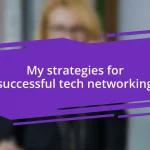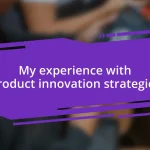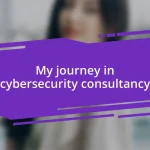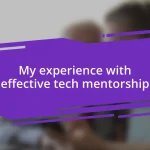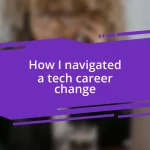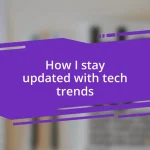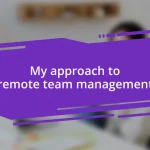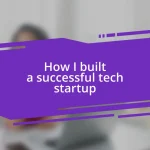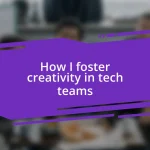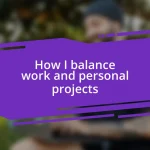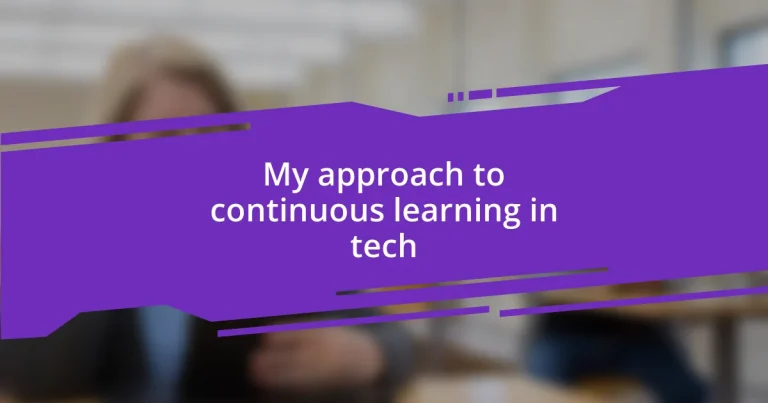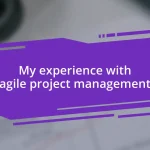Key takeaways:
- Continuous learning and a growth mindset are essential to adapt to rapidly evolving technologies in the tech industry.
- Setting specific, measurable learning goals fosters motivation and enables structured progress in acquiring new skills.
- Networking and community engagement significantly enhance knowledge exchange, collaboration, and motivation in the learning journey.
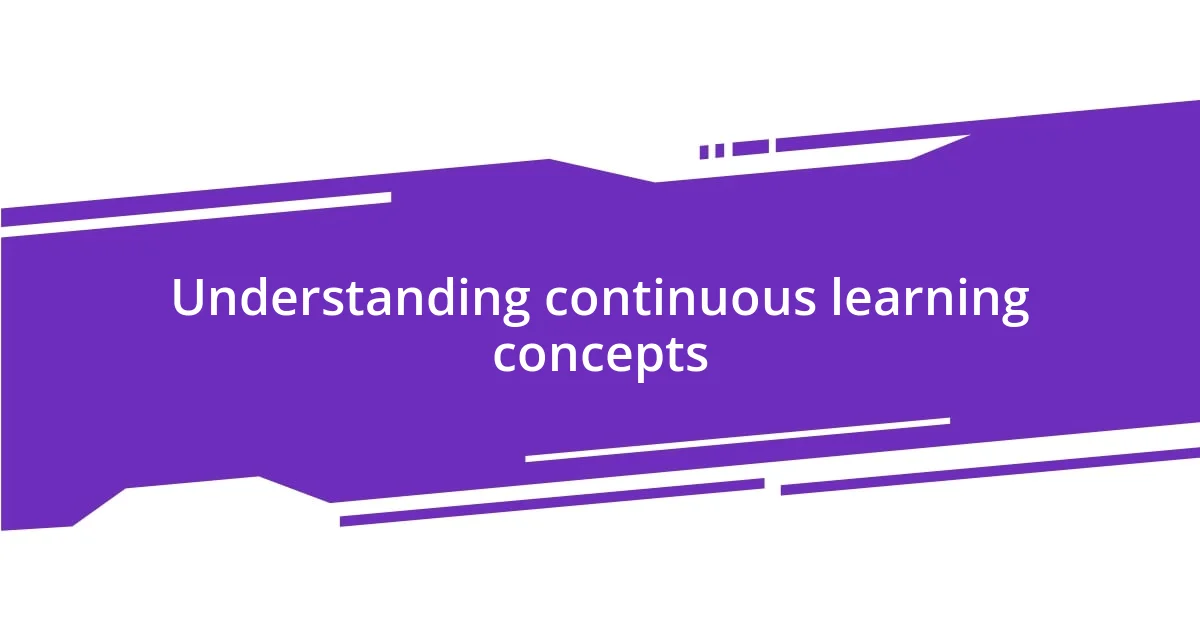
Understanding continuous learning concepts
When I first dipped my toes into the tech world, I realized that learning isn’t just a one-time event; it’s an ongoing journey. Continuous learning is the process of consistently acquiring new skills and knowledge to keep up with the rapid changes in technology. Have you ever felt overwhelmed by how fast things change? Trust me, I’ve been there too.
A key concept in continuous learning is the idea of “lifelong learning,” which resonates deeply with me. I vividly recall attending a workshop where I learned about the latest programming languages. It was exhilarating to see how what I thought I knew was evolving—and it sparked a drive in me to keep seeking new knowledge, even outside formal education. It got me wondering: how often do we actively pursue growth in our careers?
For me, adopting a growth mindset has been crucial. Embracing the notion that I can always improve and adapt has transformed my approach toward challenges. Just last month, I faced a particularly difficult coding problem, and instead of shying away, I dove into research and online courses to tackle it head-on. Isn’t it fascinating how every challenge can be an opportunity for learning if we let it be?
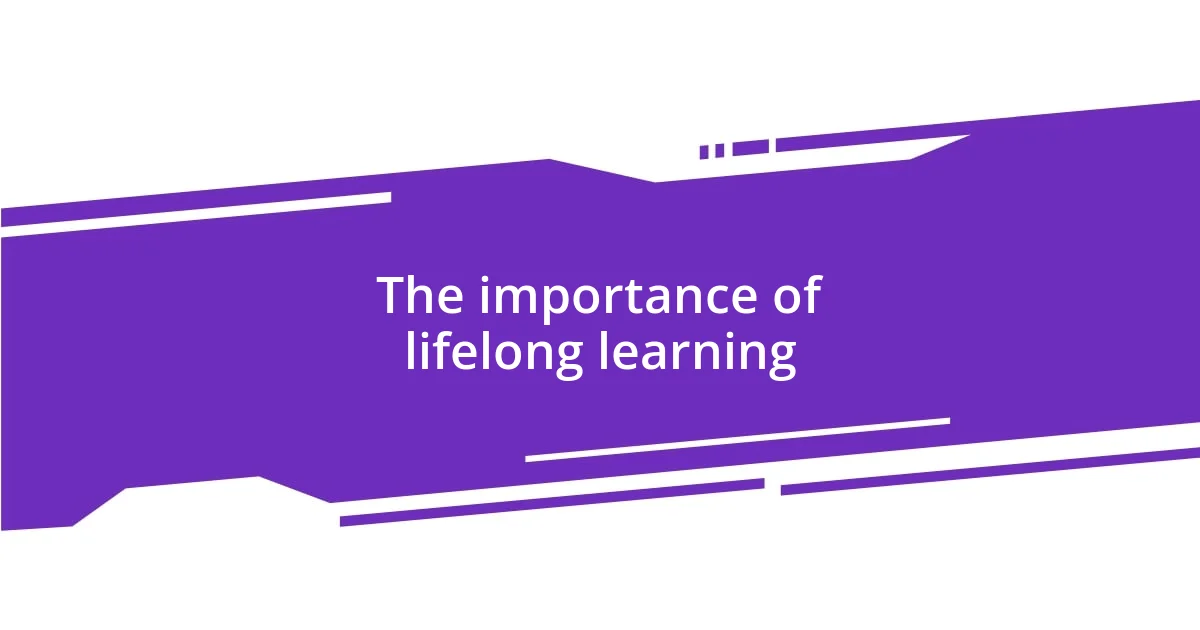
The importance of lifelong learning
Lifelong learning is crucial in today’s tech industry, where advancements happen at lightning speed. I remember a time when I thought I was well-versed in data analytics. But then, I attended a seminar that introduced me to machine learning concepts—I felt like I had barely scratched the surface! This revelation showed me that without ongoing education, I risk stagnating while the industry surged ahead.
What stands out about lifelong learning is its ability to foster adaptability. In my experience, I’ve encountered numerous situations where knowing the latest programming tools transformed the way I approached projects. Just last semester, I decided to delve into cloud computing certifications. This not only expanded my skill set but also allowed me to contribute more meaningfully to team discussions. Isn’t that a win-win?
Moreover, engaging in lifelong learning cultivates a sense of community and connection. I recall joining an online forum, where sharing insights and experiences proved invaluable. When you learn alongside others, it enriches the journey. It reminds me of the saying, “We are the average of the five people we spend the most time with.” It challenges me: who are my current five?
| Aspect | Impact of Lifelong Learning |
|---|---|
| Skill Development | Continuous improvement and adaptation to new tools and methodologies. |
| Career Growth | Enhanced opportunities and promotions due to an up-to-date skill set. |
| Networking | Expanded professional circles through engagement in learning communities. |
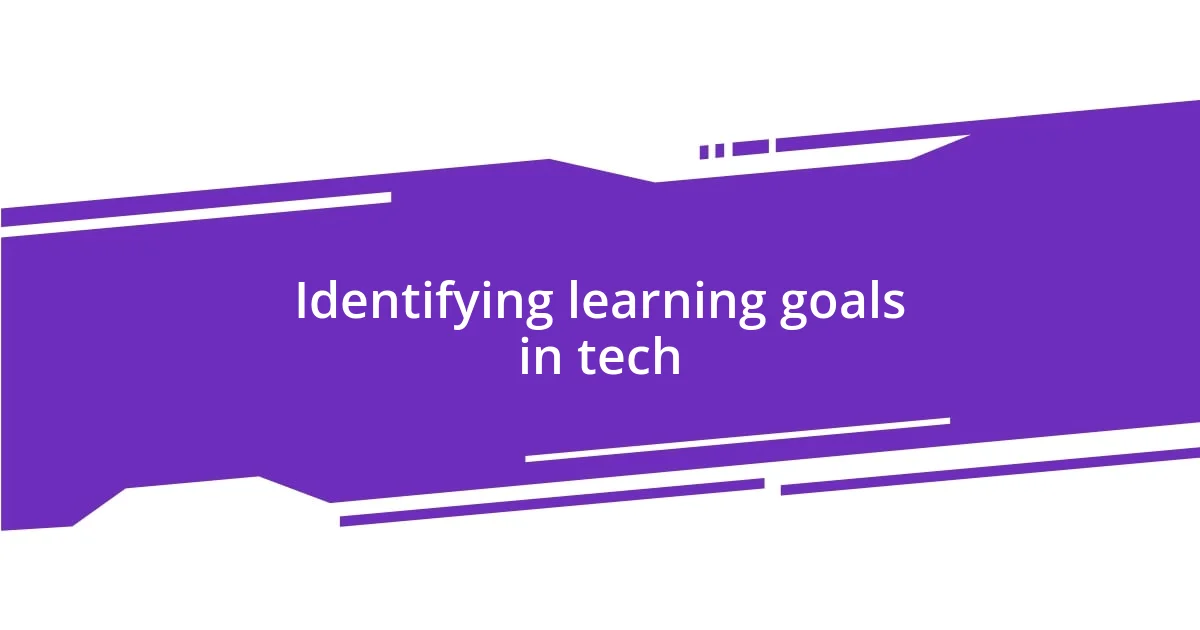
Identifying learning goals in tech
Identifying clear learning goals is the cornerstone of effective continuous learning in tech. I distinctly remember my first attempt at setting goals; I jotted down what I thought were ambitious targets, but soon realized they lacked specificity. Now, I focus on creating measurable and achievable goals. This not only keeps me motivated but also allows for periodic reviews of my progress. Think of it as having a personal roadmap: without defined destinations, it’s all too easy to lose your way.
Here’s a quick list to help you in identifying your tech learning goals:
- Specific Skills: Identify a particular technology or tool you want to master, like Python or React.
- Timeframe: Set a realistic deadline for achieving proficiency, perhaps within three to six months.
- Resources: Determine what resources you’ll use—online courses, books, or hands-on projects.
- Application: Think about practical projects where you can implement what you learn, such as building a personal website.
- Assessment: Plan how you will evaluate your progress, maybe through quizzes or presenting your work to peers.
By being intentional about your learning goals, you create a structured space for growth that aligns with the fast-paced tech environment.
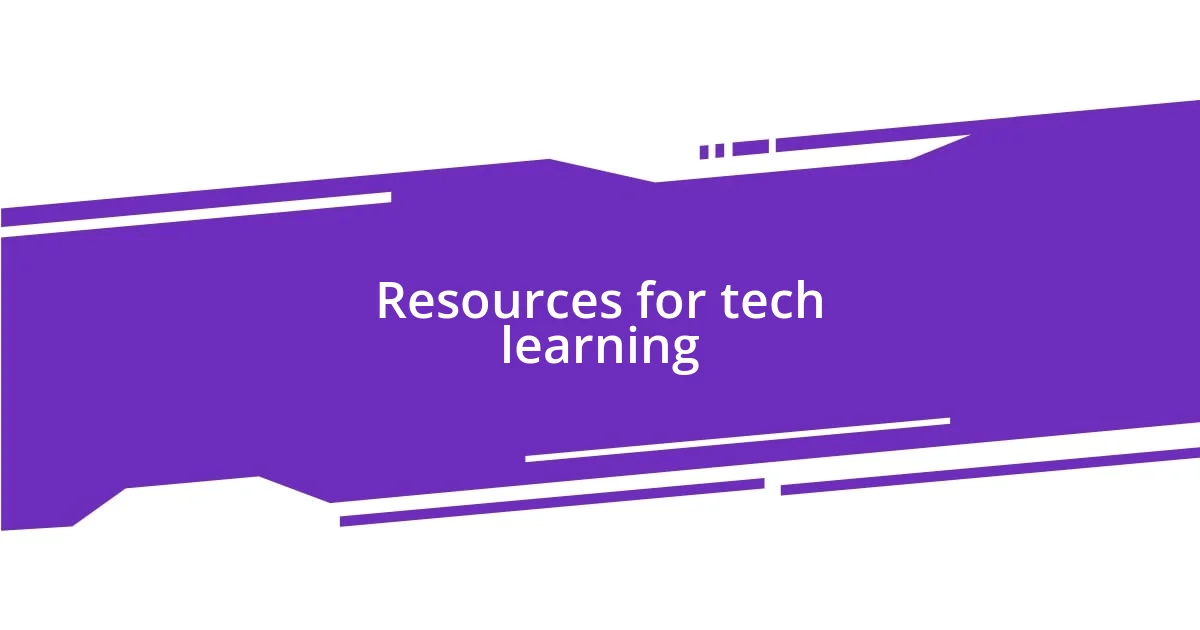
Resources for tech learning
When it comes to tech learning resources, I often think of online platforms like Coursera and Udacity, which have truly transformed my approach to continuous education. I remember enrolling in a data science specialization on Coursera; it was as if I had access to a treasure trove of knowledge at my fingertips. The flexibility of learning at my own pace was a game-changer. Isn’t it amazing how you can work on your own schedule and still gain top-notch insights from industry experts?
Books hold a special place in my learning journey as well. I’ve found that delving into well-regarded titles can provide depth and context that online tutorials sometimes lack. For instance, reading “Clean Code” by Robert C. Martin opened my eyes to writing better software, enhancing both my technical capability and my confidence. Have you ever discovered a book that completely shifted your perspective? When I find a gem like that, it feels like I’ve unlocked a new level.
Lastly, I’d be remiss not to mention the power of community-based learning. Joining local or online meetups has been a delightful addition to my toolkit. Just last month, I attended a workshop where everyone was eager to share their latest projects and collaborate on solutions. The energy in the room was palpable, and I walked away with not just new skills but also invaluable connections. Have you ever felt inspired by a group of like-minded individuals? That sense of camaraderie can significantly boost your motivation to learn.
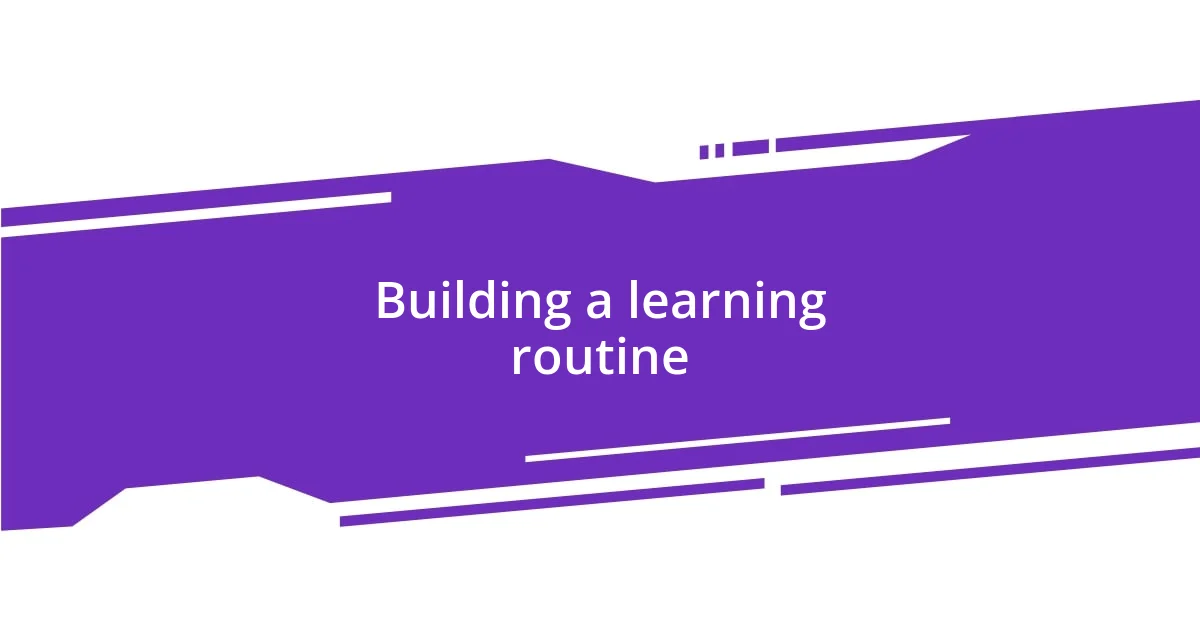
Building a learning routine
When building a learning routine, I’ve found that consistency truly is key. For me, dedicating specific time slots in my weekly calendar to learning creates a habit that’s hard to break. Picture this: every Tuesday and Thursday evening, I dive into my coding exercises as if they were a fun night out. I often ask myself, “What if I treat learning like a commitment to my health or fitness?” The discipline I apply here leads to remarkable results.
Another approach I’ve embraced is mixing up the types of learning I engage in. Sometimes, I alternate between hands-on projects and theory-based study. I remember a particularly frustrating week spent wrestling with a challenging coding problem; instead of giving up, I switched to reading about algorithms. This break in routine not only refreshed my mind but also made the subsequent coding sessions more fruitful. Have you ever noticed how a change in perspective can unlock a solution you’d been struggling with?
Building a learning routine also involves creating a supportive environment. I like to surround myself with resources that inspire and motivate me—be it books on my shelf or podcasts in my playlist. Just last month, I reorganized my workspace, adding visual reminders of my learning goals, which instantly invigorated my motivation. It’s amazing how altering your surroundings can impact your mindset. How do you ensure your environment fuels your passion for learning? For me, it’s about making my space a constant reminder of my journey.
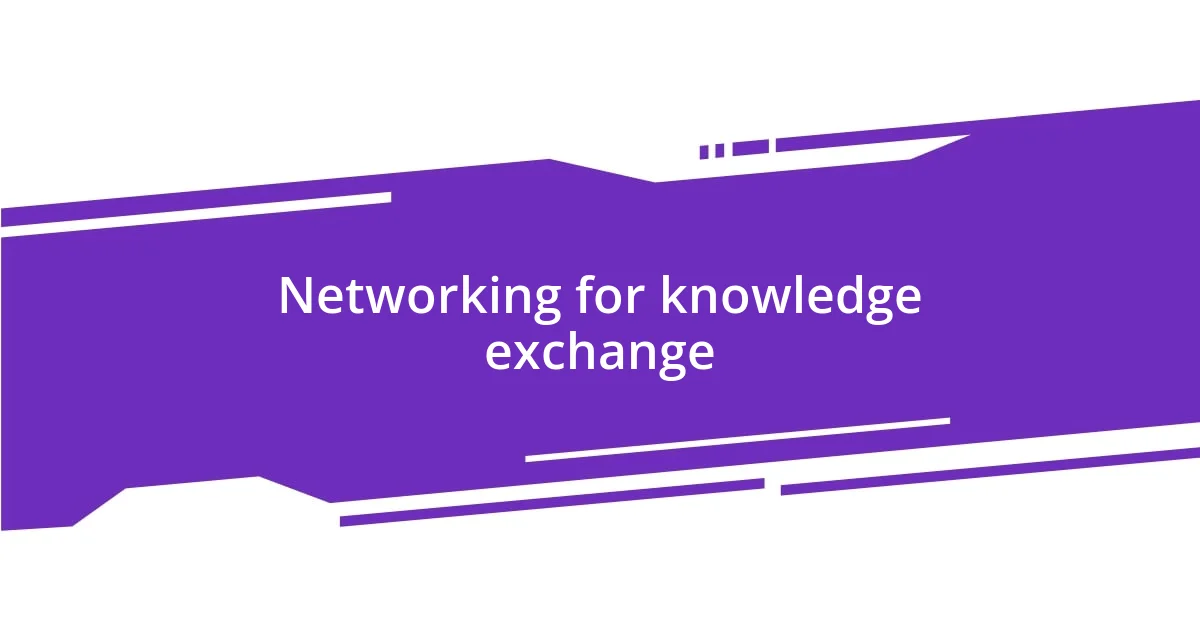
Networking for knowledge exchange
Networking plays a pivotal role in knowledge exchange, particularly in the tech field where things evolve rapidly. I distinctly remember a time at a tech conference where I struck up a conversation with a software engineer working at a company I admired. That exchange led to unexpected insights about new cloud technologies I hadn’t even considered. Isn’t it amazing how a simple chat can reveal pathways to knowledge you never knew existed?
Being part of professional networks online, such as LinkedIn groups or tech-focused Discord channels, has significantly broadened my horizons. I often share what I’ve learned and, in turn, I’m amazed at how others generously share their expertise in return. Just last week, I participated in a thread about machine learning algorithms and found several innovative approaches that completely reshaped my understanding. Have you ever found yourself diving into a conversation that shifted your perspective entirely?
Bridging connections with professionals, whether through meetups or virtual forums, can foster a rich environment for collaboration and innovation. I vividly recall a collaborative project that emerged from a workshop, where we tackled a real-world problem together. Working alongside others not only enhanced my skills but reinforced the idea that learning doesn’t have to be a solo journey. How often do you reflect on the impacts of shared learning experiences in your own life? For me, those moments emphasize the beauty of continuous growth through community.
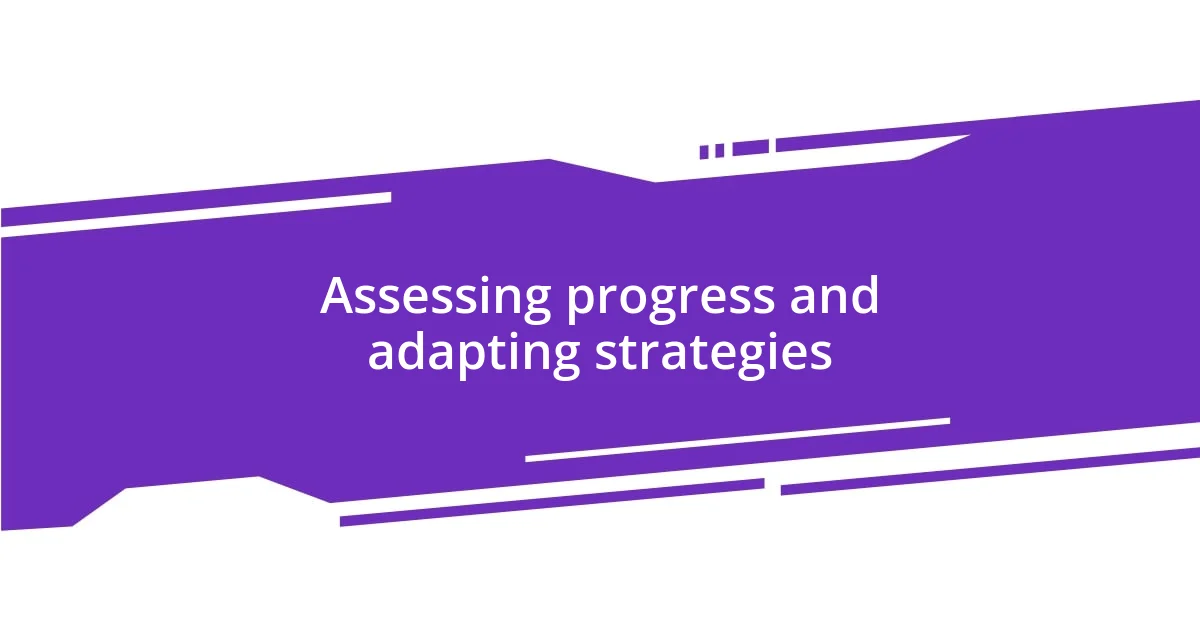
Assessing progress and adapting strategies
Assessing progress is crucial in the ever-evolving tech landscape. I remember hitting a plateau in my skills about a year ago, where progress felt painfully slow. To navigate this, I started logging my learning milestones, celebrating small victories like solving a complex bug or finishing a tough course. Has tracking your achievements ever reminded you how far you’ve come? For me, it turned frustration into motivation.
Adapting strategies is just as important as assessing progress. When I noticed that my typical coding practices weren’t yielding the improvements I desired, I took a step back. I began experimenting with new methodologies like Agile and Design Thinking, which introduced flexibility to my work process. This shift was eye-opening; it felt like switching on lights in a dim room. Have you ever felt a strategy click just right? That moment of clarity can be transformative.
Incorporating feedback from peers is another strategy I’ve found invaluable. I recently sought input from a colleague after completing a project, and their insights illuminated areas for improvement that I hadn’t considered. This conversation not only refined my approach but also deepened my appreciation for collaboration in learning. How do you integrate external perspectives into your growth? For me, it fuels a cycle of refinement and innovation that I cherish.
